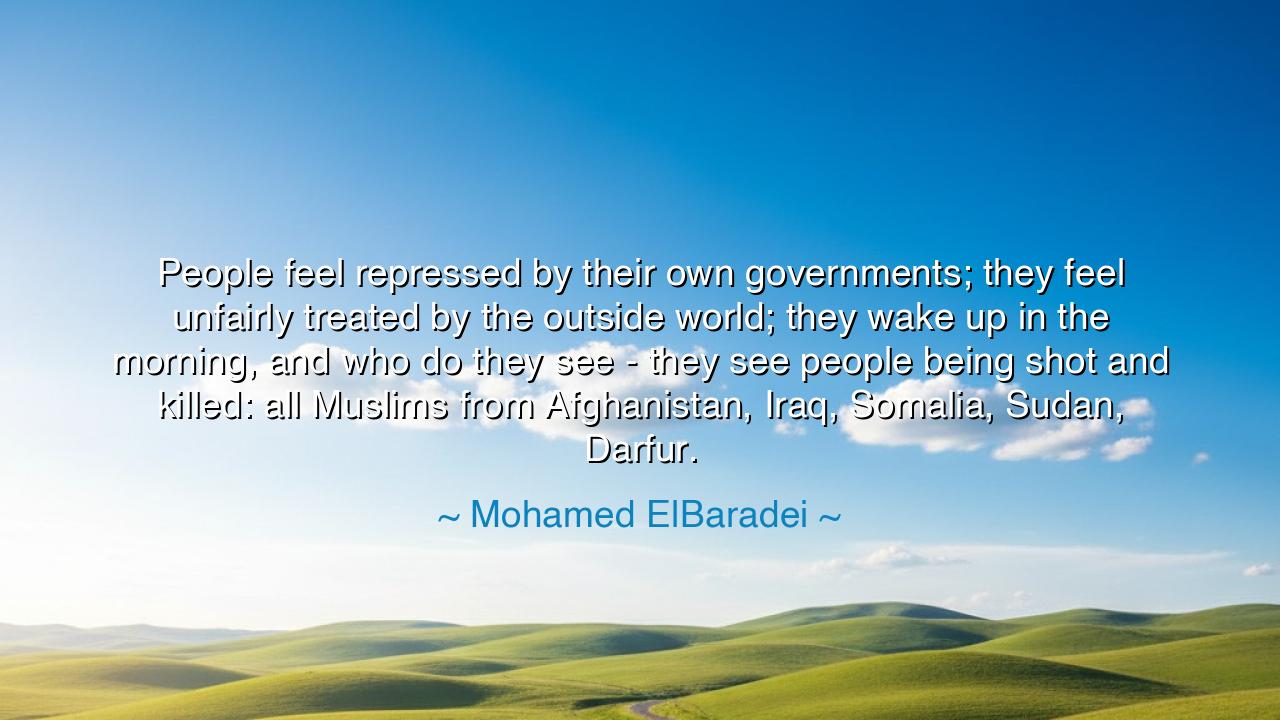
People feel repressed by their own governments; they feel
People feel repressed by their own governments; they feel unfairly treated by the outside world; they wake up in the morning, and who do they see - they see people being shot and killed: all Muslims from Afghanistan, Iraq, Somalia, Sudan, Darfur.






“People feel repressed by their own governments; they feel unfairly treated by the outside world; they wake up in the morning, and who do they see – they see people being shot and killed: all Muslims from Afghanistan, Iraq, Somalia, Sudan, Darfur.” So spoke Mohamed ElBaradei, a man who walked the halls of power and yet never forgot the cries of the powerless. His words are not just observation, but lamentation, a dirge for a world caught in cycles of injustice and violence. In them we hear the anguish of millions who rise each day not to hope, but to images of their kin slaughtered, their dignity trampled, their humanity ignored.
The first wound ElBaradei names is the repression by their own governments. The ancients, too, warned of this peril. For when the shepherd becomes a wolf, the flock suffers most bitterly. A ruler’s duty is to protect and uplift his people, but when power is twisted into tyranny, the people themselves become prisoners in their own homes. The cry against injustice is louder when it comes not from foreign invaders, but from those who swore to guard. Thus do nations rot from within, when leaders betray the sacred trust of governance.
The second wound is the sense of being unfairly treated by the outside world. Empires, alliances, and powers beyond one’s borders often decide the fates of the weak without regard for their cries. This, too, is not new. Recall the Partition of Africa, when lines were drawn on maps by strangers who never walked the deserts or rivers they divided, and entire peoples were left torn between false boundaries. What ElBaradei names is this same wound repeated in modern times: when nations are judged not as equals, but as pawns, their people grow weary with bitterness, feeling their suffering invisible to those who enjoy power.
Then comes the cruelest wound: the images of death that greet the eyes each morning. Not the stories of triumph, not the news of harvest, but the endless sight of people being shot and killed. Worse yet, the dead are bound by a shared identity, marked as Muslims—from Afghanistan, Iraq, Somalia, Sudan, Darfur. To wake daily to the slaughter of one’s brothers and sisters is to feel the universe itself stacked against you, to believe that existence has been reduced to a single fate: to bleed, to bury, to mourn. It is despair given form, despair made visible on every screen, in every headline.
History offers us the same tragic vision in the memory of the Jews of Europe during the Holocaust, who awoke daily to laws stripping them of dignity, to ghettos, to deportations, and finally to extermination. They, too, felt betrayed by governments, abandoned by the world, and condemned to suffering simply for being who they were. The echo is clear: when one group of people becomes the constant face of violence, the soul of that people is scarred across generations.
ElBaradei’s words, though heavy, are not without purpose. For in naming the grief, he calls the world to awareness. His warning is clear: despair does not remain silent. A people who feel repressed, unfairly treated, and marked for death will not simply disappear. They will seek to be heard, whether in peace or in fury. The responsibility, then, lies not only with rulers and nations, but with every soul who claims to honor justice. For silence in the face of such suffering is complicity.
The lesson for us is this: see beyond the veil of distraction, and recognize the suffering of others as your own. Do not allow yourself to grow numb to images of death; do not dismiss the grief of distant lands as though it does not touch you. Every act of solidarity, every word for peace, every stand against injustice matters. In your own life, refuse to treat others with the coldness you condemn in governments. In your own community, refuse to let prejudice or cruelty take root.
Therefore, children of tomorrow, let this be your practice: awaken each day not only to your own struggles, but to the pain of the world. If you see injustice, speak. If you can aid the weary, act. If you can sow peace, sow it even in small measures. For though the grief of Afghanistan, Iraq, Somalia, Sudan, Darfur may seem distant, it is not foreign—it is human. And in defending the humanity of others, you defend your own.
So remember ElBaradei’s warning: when people wake only to repression, injustice, and death, despair will rule the earth. But if we awaken to compassion, courage, and justice, then even the blood-stained morning can become the dawn of hope.






AAdministratorAdministrator
Welcome, honored guests. Please leave a comment, we will respond soon